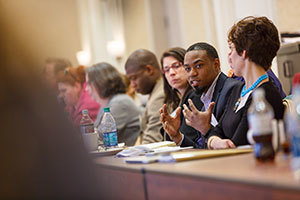
Most universities were founded with a civic purpose, but university research and scholarship are often criticized for being disengaged from the challenging realities of public life. Last Friday and Saturday (March 27 and 28), the University of Notre Dame hosted the annual national meeting of an organization that seeks to reassert the civic purpose of universities by working to join academic resources with community needs around the country and beyond.
The Research University Civic Engagement Network (TRUCEN) began as a network of 13 U.S. research universities formed in 2005. It has now grown to include 40 universities, many of which are among the most prestigious in the country.
Forty participants from 29 institutions attended this year’s national meeting, which focused on the impact of community and civic engagement. Speakers addressed some of the following questions:
- How can universities offer learning opportunities that are likely to result in the greatest possible impact in communities?
- How can universities collaborate to support engagement at research universities and foster long-term impact?
- Should engagement be part of core requirements and general education?
- How does engaged learning impact students, both undergraduate and graduate?
The final two sessions of the meeting focused on how universities currently implement civic engagement and how they are changing to support engagement initiatives. In recent years, Notre Dame has changed its institutional structure to reflect a renewed commitment to civic engagement. Since it joined TRUCEN in 2010, the University has formed the Community Engagement Coordinating Council (CECC). The stated purpose of the CECC is “to establish and deepen a culture of community engagement at the University of Notre Dame. Such engagement emanates directly from the University’s Catholic ethos and character and builds on the rich assets of its students, faculty, staff and community partners.”
Contact: JP Shortall, Center for Social Concerns, 574-631-3209, James.P.Shortall.1@nd.edu